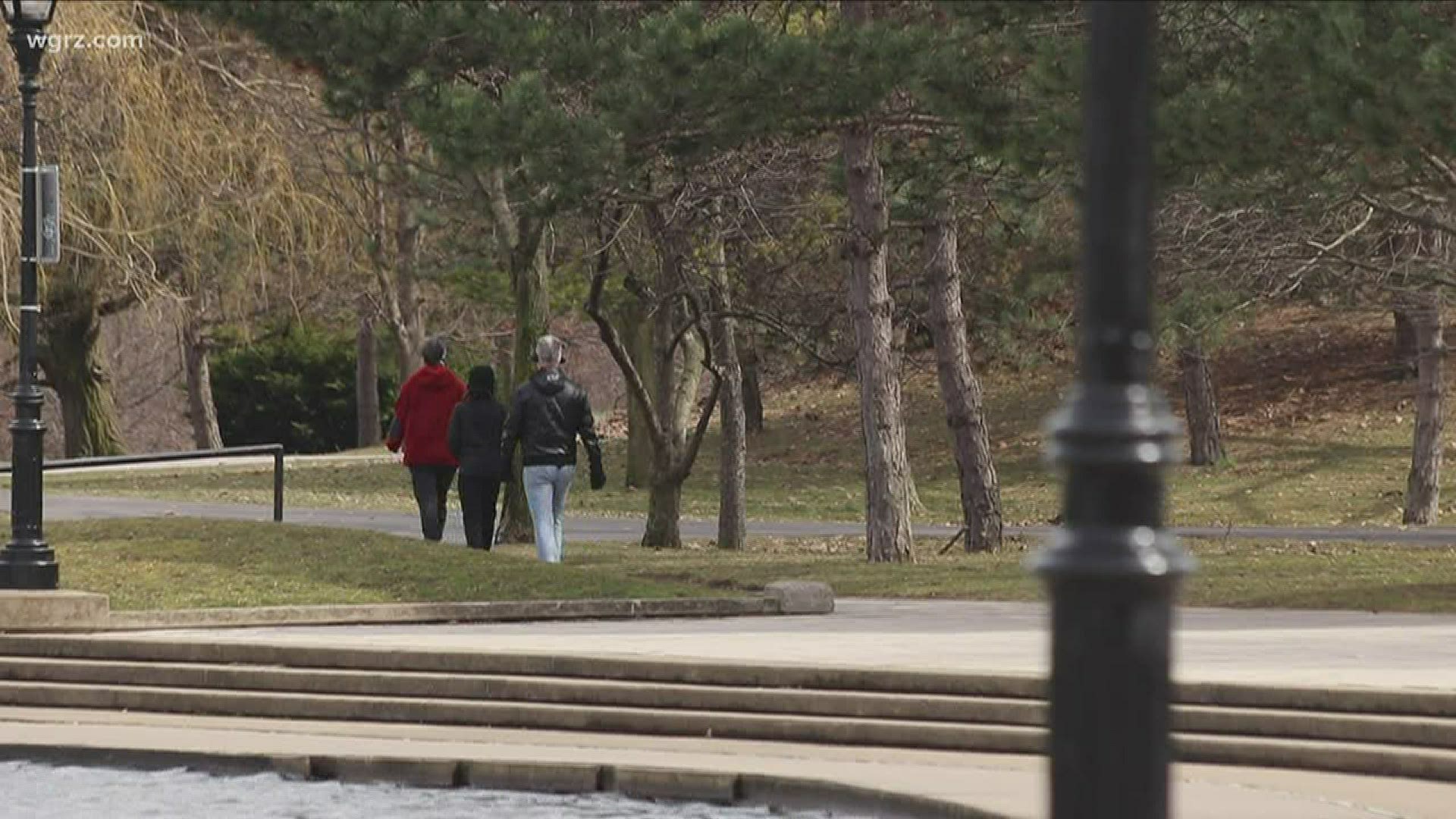ERIE COUNTY, N.Y. — Erie County Executive Mark Poloncarz reported seven more deaths related to coronavirus (COVID-19) in the county on Wednesday, bringing the total number of deaths to 46.
Erie County gave a breakdown of the races of those who passed away from COVID-19. Before the news of one more death on Wednesday night, Poloncarz said of the 45 people who had died, 30 were white and 15 were black/African American.
Erie County currently has a total of 1,345 confirmed cases with 957 people currently in isolation. In addition, 349 people have recovered so far. There are 950 active cases.
Poloncarz said Wednesday afternoon that the hospitalization of patients is continuing to grow locally. As of Tuesday 221 people were hospitalized. Of those hospitalized, 119 were in ICU and 113 of those individuals had an airway assist.
On Thursday, Poloncarz released the statistics of the confirmed cases in Erie County via Twitter.
Poloncarz is reminding people to stay home and to continue practicing smart social distancing, adding that the peak is two to three weeks away.
The Erie County executive says practicing social distancing is key to getting through this.
"We know we haven't reached our peak yet. It's as simple as that," Poloncarz said. "We have modeling from the University at Buffalo, we have modeling from other locations, too, that shows our peak number of cases, and our peak hospitalization, is still weeks off. What day it is, I can't say. I don't know.
"We do know that if we don't flatten the curve, if we just went back to everything's normal, and we don't practice good social distancing, we'll have that peak much sooner. There'll be many, many, many more people across western New York who will contract it, will need hospitalization, and many more people will die."
We know more testing kits are arriving, everyone at Father Baker Manor was tested last week, we wanted to know what does that mean for the rest of us.
"As the county gets more testing kits, when do you add those essential workers who are on the front lines like the people working at the grocery stores who are keeping us all fed to the list of people who will get tested?" asked 2 On Your Side's Kelly Dudzik Wednesday afternoon.
"I'd really have to defer to the Health Department," Poloncarz said. "I know we have guidance from the New York State Department of Health. We are required once when we find an individual is positive, we have to contact trace them. We do have nurses and others from our Health Department having conversations with them. We are very worried about having hundreds and hundreds, or thousands more cases and being able to do proper contact tracing.
"But we are continuing to increase testing, I think it's been noticeable. I've released some data at the end of each day showing that we have increased testing. So, I can't, I'm not the one who makes that call, Kelly. It's really the Health Department that makes that call, and our goal is to ensure that those that are at risk, get tested. If there is somebody who works in a setting that is in the public, and they are showing the signs of COVID-19, first off, they shouldn't go to work. You should stay home and you got to contact your doctor and have your doctor contact us."
The Erie County executive says the county is looking to see what they need to do to help businesses right now and what they need to do to help them when the pandemic is over. To help local businesses Poloncarz announced the creation of the Erie County Business Task Force.
The immediate actions of the task force include working with Erie County IDA to ensure businesses have the resources they need.
The first meeting will be Thursday.
A Western New York COVID-19 business impact survey will also be launched on April 14. This will help assess the coronavirus impact on Western New York businesses and devise how public and private sectors can work together to address possible gaps in available resources.
Anyone with questions about COVID-19 can call the Erie County COVID-19 hotline number from 8 a.m. to 8 p.m. (716) 858-2929.
The current number of confirmed cases in Erie County communities include:
- 527 cases in Buffalo
- 171 cases in Amherst/Williamsville
- 105 cases in Cheektowaga/Sloan
- 97 cases in Tonawanda/Kenmore
- 78 cases in Hamburg/Blasdell
- 69 cases in Orchard Park/Village
- 62 cases in Lancaster/Village
- 51 cases in West Seneca
- 31 cases in Clarence
- 27 cases in Grand Island
- 26 cases in Aurora/East Aurora
- 23 cases in Alden/Village
- 19 cases in Elma
- 17 cases in Lackawanna
- 13 cases in Evans/Angola
- 5 cases in North Collins/Village
- 4 cases in Boston
- 4 cases in Newstead/Akron
- 3 cases in City of Tonawanda
- 2 cases in Wales
- 2 cases in Holland
- 2 case in Concord/Springville
- 2 cases in Collins/Gowanda
- 1 cases in Brant/Farnham
- 1 case in Marilla
- 1 case in Sardinia
- 1 case in Colden
- 1 case in Eden
Human coronaviruses are usually spread through...
- The air by coughing or sneezing
- Close personal contact, such as touching or shaking hands
- Touching an object or surface with the virus on it, then touching your mouth, nose or eyes before washing your hands.
Help stop the spread of coronavirus
- Stay home when you are sick.
- Eat and sleep separately from your family members
- Use different utensils and dishes
- Cover your cough or sneeze with your arm, hot your hand.
- If you use a tissue, throw it in the trash.
Lower your risk
- Wash your hands often with soap and water for at least 20 seconds. If soap and water are not available, use an alcohol-based hand sanitizer.
- Avoid touching your eyes, nose, and mouth with unwashed hands.
- Avoid close contact with people who are sick.
- Clean and disinfect frequently touched objects and surfaces.
- If you are 60 or over and have an underlying health condition such as cardiovascular disease, diabetes or respiratory illnesses like asthma or COPD, the World Health Organization advises you to try to avoid crowds or places where you might interact with people who are sick.


